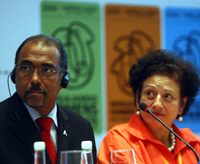
Feature Story
Forum seeks to engage men and boys in goal of achieving gender equality
31 March 2009
31 March 2009 31 March 2009 (from left) Mr Michel Sidibé, UNAIDS executive director and Brazil’s Minister of Policies for Women Nilcéa Freire at the opening of Engaging Men Symposium, 30 March 2009.
(from left) Mr Michel Sidibé, UNAIDS executive director and Brazil’s Minister of Policies for Women Nilcéa Freire at the opening of Engaging Men Symposium, 30 March 2009. Credit: UNAIDS/D.Ramalho
A global symposium on engaging men and boys in achieving gender equality is taking place this week in Rio de Janeiro, Brazil. Addressing the opening ceremony last night, UNAIDS Executive Director Mr Michel Sidibé spoke of the need for all to “work over the long term to end the social acceptance of violence against women and the gender inequality that underpins it.”
“We must engage with men and boys to promote awareness of the need for a “new masculinity,” continued Mr Sidibé.
The event was opened by Brazil’s Minister of Policies for Women, Ms Nilcea Freire. Other speakers at opening ceremony included: UNIFEM Executive Director, Ms Inés Alberdi; UNFPA Deputy Executive Director, Ms Purnima Mane; Ambassador of Canada to Brazil, Mr Paul Hunt; World Health Organization Department of Gender, Women and Health, Coordinator, Peju Olukoya; and UNDP Resident Representative and UN Resident Coordinator, Ms Kim Bolduc.
Three over-arching themes of “men and violence”; “men and health”; and “men and care-giving” will be covered during the conference. Yesterday, before opening the symposium, the Executive Director of UNAIDS Michel Sidibé joined the Brazilian Minister of Women’s Policies, Ms Nilcéa Freire, in inaugurating the first centre in Brazil that focuses on rehabilitating men who abuse women. Located in Nova Iguaçu, a municipality in Rio de Janeiro, the centre will place emphasis on education programmes to put a end to domestic violence. Ten other such centres are planned for throughout the country.
Gender and HIV
We must all work over the long term to end the social acceptance of violence against women and the gender inequality that underpins it
Michel Sidibé, Executive Director, UNAIDS
Gender comprises widely held beliefs, expectations and practices within a society that define ‘masculine’ and ‘feminine’ attributes, behaviours and roles and responsibilities. Given that gender constructions are relational – one sex defined in contrast to the other, the organizers of the Rio symposium believe that men and women must both be involved in the goal of achieving gender equality. Work with men is seen as a vital component, together with, rather than apart from, work to empower women and girls.
Gender norms in many societies may dictate that women and girls are less equal than men in the home, workplace and in negotiating sex. In some societies concepts about masculinity may reinforce a belief that men should seek multiple sexual partners or take risks. These norms work against HIV prevention messages that support protection measures and fidelity. Some notions of masculinity also condone violence against women, or lead to homophobia, which results in stigmatization of men who have sex with men, making these men more likely to hide their sexual behaviour and less likely to access HIV services.
Violence and HIV
According to a 2006 report by United Nations Secretary-General at least one out of every three women around the world has been beaten, coerced into sex, or otherwise abused in her lifetime, with the abuser usually someone known to her.
In the context of HIV, men’s use of physical or sexual violence against women, or the threat of violence increases women’s vulnerability to the disease by making it difficult or impossible to negotiate safer sex and condom use. It can also stop women from accessing HIV prevention, care and treatment services. Women may also avoid HIV testing due to fears of violence and abandonment in a resulting discovery of HIV-positive status.
Moving forward
This week’s Symposium will include dialogue sessions with representatives of the women’s rights movements and other social justice movements. Skills-building workshops to build capacity of participants in designing, implementing and evaluating behaviour change advocacy and community mobilization strategies and also working with young children and teenagers in achieving gender equality.
The participants hope to develop a “Call to Action” for governments to implement policy that engages men and boys in gender equality. Engaging men and boys in achieving gender equality will combine presentations of best practices, skills building workshops, and dialogues between representatives of non-governmental organizations, policymakers, and researchers. It runs until 3 April.
Right Hand Content
Cosponsors:
Partners:
Global Coalition on Women and AIDS
UNIFEM Gender and AIDS
Speeches:
Read speech to Opening of the Global Symposium: Engaging Men and Boys in Achieving Gender Equality by Michel Sidibé, Executive Director, UNAIDS (30 March 2009)
Feature stories:
Commission on the Status of Women opens with call for action to achieve universal access and gender equality (02 March 2009)
External links:
Engaging men and boys in achieving gender equality
MenEngage



